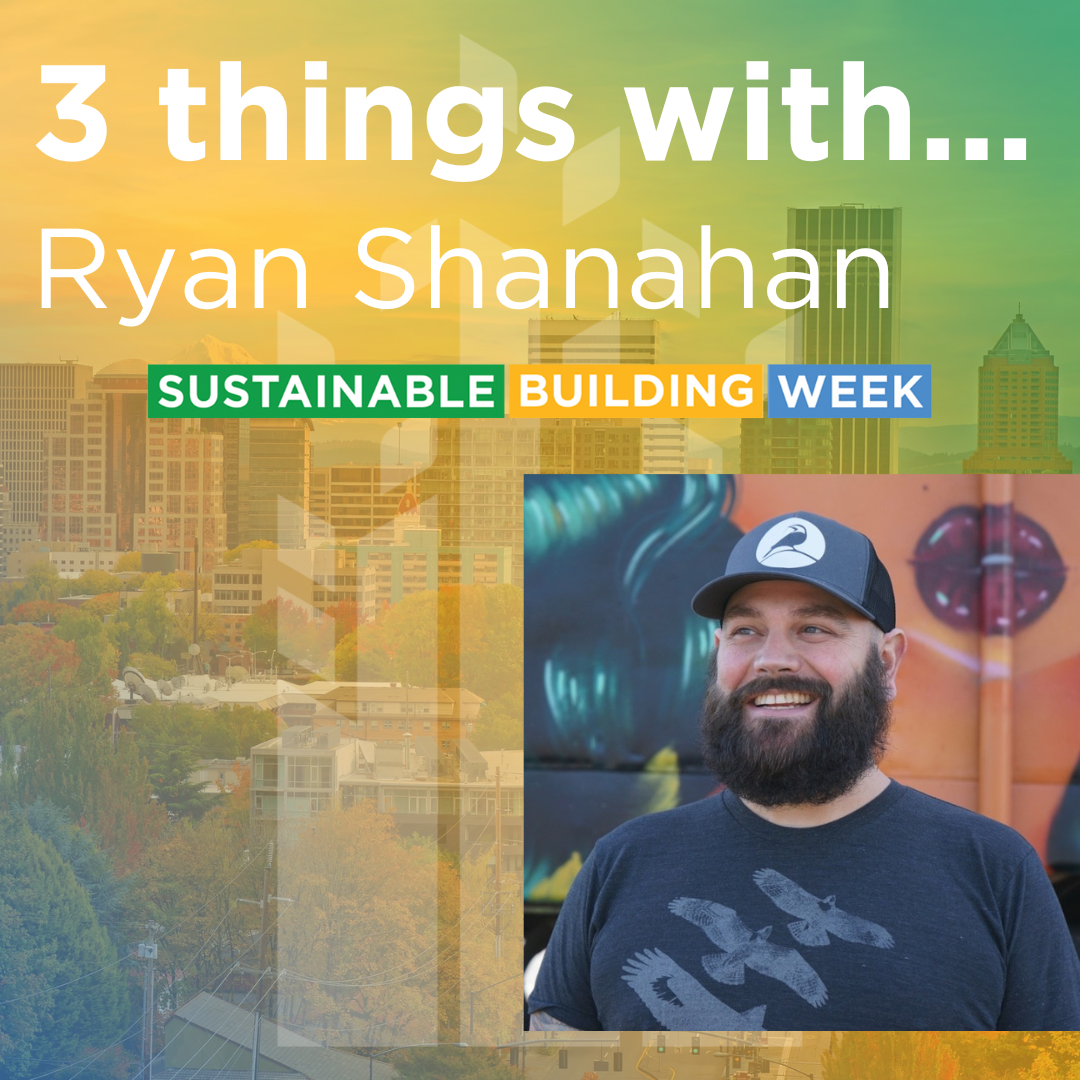3 Things with … Ryan Shanahan

3 Things with … Ryan Shanahan
During last fall’s Sustainable Building Week, we ran a series of interviews with some of Portland’s sustainability community and shared their answers to questions we posed. Let’s keep the ball rolling throughout the year!
Meet Ryan Shanahan from Birdsmouth Design-Build where he helps residential customers go all-electric and retrofit their homes to Zero Energy. As part of that he does project managing, as well as writing/ presenting lessons learned, the value of electrification, zero energy, zero carbon, and healthy, durable, resilient buildings.
But wait! There’s more! Ryan is also the host of The Retrofit Podcast, the official podcast of Green Building Advisor where he interviews industry experts to learn more about the challenges facing the construction industry and discuss solutions to creating a better performing, truly sustainable built environment.
What does sustainable mean to you?
I could recite the same definition we’ve all learned about “consumption with respect for future generations” but I think this is a great opportunity for me to plug my mantra that the future is efficient, electric, and renewable. I honestly hope this phrase takes off as the next “reduce, reuse, recycle” in that it is memorable, easy to recite, and the order of the steps is important. I read a lot of sustainability news about decarbonization and electrification that also mentions renewables but fails to mention the critical role that efficiency plays. Not only is efficiency one of the most cost-effective ways to make our transition to a sustainable future, it offers a whole host of other benefits including resiliency, smaller-scale infrastructure improvements, smaller-scale electric systems, less refrigerants, smaller batteries, smaller peak loads, load shifting, and more. This is mostly coming from a place of how to make buildings more sustainable but you can apply this same thinking to many other facets of our world that consume energy. It’s also really exciting to see how much attention embodied carbon and/or upfront emissions are finally getting. For example, It’s important to consider the upfront emissions in one insulation type vs another when we focus on the efficiency piece. Without this critical lens, we could pump a lot more GHGs into the atmosphere today than we can afford to all while attempting to make good on our promise to save our “future generations.”
Name a Portland (or Oregon) project or collaboration that has inspired you and tell us why you are inspired by it.
The Portland Clean Energy Fund doesn’t get enough positive press from a national viewpoint. I find myself framing it as “Portland’s Green New Deal” when talking to friends or family that aren’t exactly sure what it is because it’s hard to explain all of the good that this one program does for our city. The idea that we could take a tax on the rich and then Robin Hood-style dole it out to organizations that are focused on creating jobs, lifting folks out of poverty, retrofitting our buildings, building affordable housing, planting trees, creating renewable energy and more all with a focus historically marginalized groups is like a dream scenario and we actually did it! I hope it can be a model for other municipalities around the state, if not our whole country.
Tell us a bit about your March 14 Sustainable Building Monthly preso – what will people learn/ take away?
I’ve been giving presentations on how to design and build zero-energy homes for years now. Every single time one or more people in the audience asks “but what about all of the existing buildings”? The 7 Cost Effective Steps to Zero Energy Retrofits is a free tool we created at the ZERO Coalition to answer that question. Each of the 7 Steps includes useful information on why that step is important, tips on how to implement the step, as well as additional resources we’ve broken out by building typology: single-family homes, multifamily, and commercial. Spoiler Alert: because all existing buildings are different, an assessment of the building by a professional energy efficiency consultant using diagnostic tools is the first step!
If you haven’t registered for March 14th’s Sustainable Building Monthly’s event with Ryan on Zero Energy Retrofits, do it now!
Recent News
September 23, 2024
September 09, 2024
September 19, 2023
Stay in the Know!
© 2024 Sustainable Building Week. Website by Triple Play Studio


